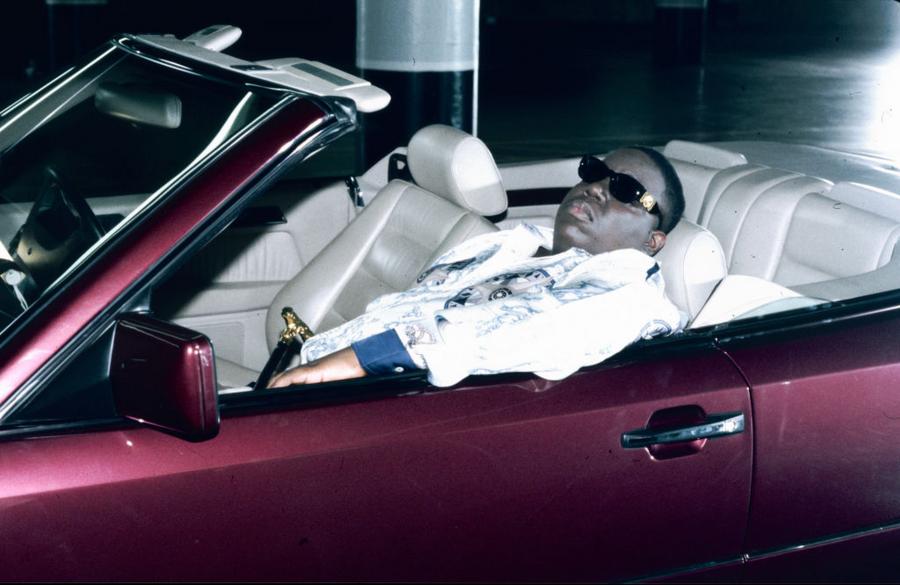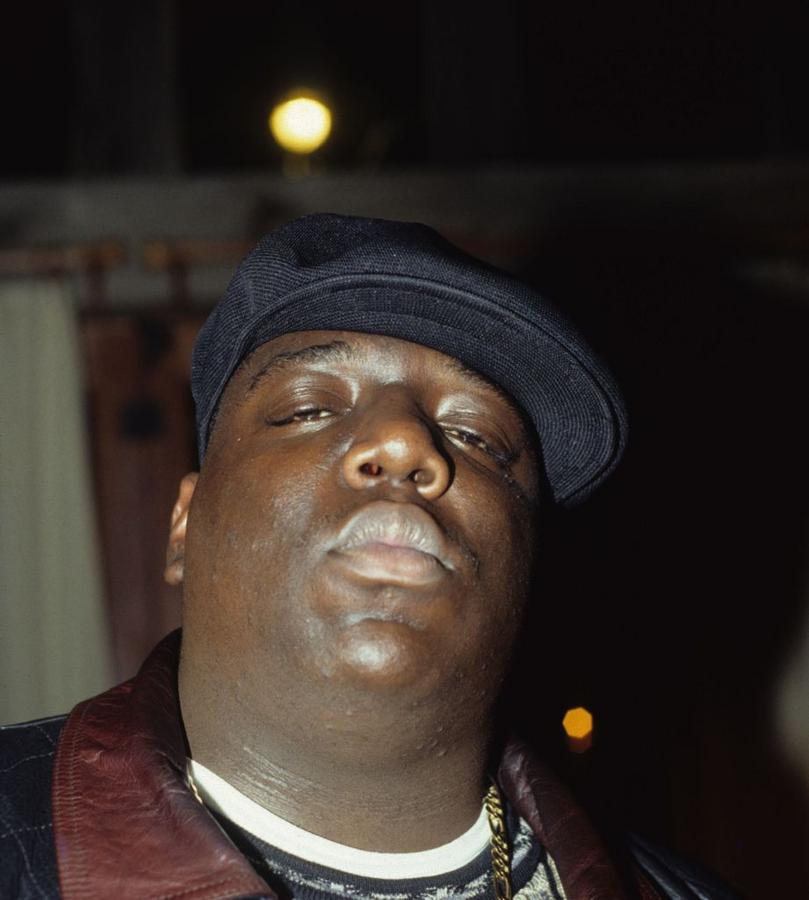What Was The Notorious B.I.G.'s Net Worth?
The Notorious B.I.G. was an iconic American rapper who had a net worth equal to $10 million at the time of his death (after adjusting for inflation). The Notorious B.I.G. died on March 9, 1997, at the age of 24, in a drive-by shooting that is still unsolved as of this writing.
The Notorious B.I.G., born Christopher Wallace and also known as Biggie Smalls, stands as one of the most influential and remarkable figures in the history of hip-hop. With a career tragically cut short by his murder in 1997, Biggie left an indelible mark on the music industry and culture at large, crafting narratives that were both viscerally streetwise and poignantly vulnerable. Originating from Brooklyn, New York, he transformed his tumultuous experiences into rhymes that captured the harsh realities of urban life while also communicating universally relatable feelings of ambition, despair, and desire.
Biggie's debut album, "Ready to Die" (1994), is widely regarded as one of the greatest hip-hop albums of all time. It was a critical and commercial success, telling stories of crime and struggle with lyrical dexterity and a captivating flow. His narrative style, paired with an intrinsic ability to create catchy hooks, appealed to hardcore hip-hop fans and mainstream audiences alike. Biggie was not just a rapper; he was a storyteller who managed to articulate the anxieties, dreams, and tales of life in the streets with a poetic finesse and gritty authenticity.
The rapper's turbulent relationship with fellow iconic rapper 2Pac became a focal point in the media, symbolizing the tension between East Coast and West Coast rap during the 1990s. Both artists utilized their platforms to take jabs at each other, perpetuating a rivalry that some believe ultimately led to their untimely deaths.
Biggie's impact on hip-hop transcends his discography. His stylistic innovations in flow, narrative, and charisma have influenced generations of artists who followed him. His posthumously released album, "Life After Death," solidified his legacy, showcasing a range of collaborative tracks with an array of artists and spawning numerous hits that still resonate with audiences today.
In spite of his untimely death, The Notorious B.I.G.'s legacy endures, underscoring the timeless nature of his artistry. His influence continues to permeate contemporary hip-hop, reinforcing the poignancy, rawness, and authenticity that characterized his illustrious, albeit brief, career.

Notorious BIG February 1997. (Photo by Nitro/Getty Images)
Early Life
The Notorious B.I.G. was born Christopher George Latore Wallace on May 21, 1972, in Brooklyn, New York. He was the only child of Jamaican parents Voletta Wallace and Selwyn George Latore. His father left the family when Wallace was just two years old. He grew up in Clinton Hill, Brooklyn, near the border of Bedford-Stuyvesant. He thrived academically in middle school and won numerous awards for English.
Christopher started dealing drugs when he was just 12 years old. He began rapping as a teenager, entertaining people on street corners and performing in local groups. He attended Westinghouse Career and Technical High School, the same school where future rappers Jay-Z, Busta Rhymes, and DMX attended. He left school at the age of 17 and got deeper into the world of drug dealing, leading to several arrests. In 1991 he spent nine months in jail on a crack sale charge.
Rap Career
After getting out of jail, he recorded a demo titled "Microphone Murderer" under the moniker "Biggie Smalls." The tape eventually made its way to the editor of "The Source," who listed Biggie in the magazine's "Unsigned Hype" column. The demo tape also made its way to an A&R rep/producer at Uptown Records named Sean "Puffy" Combs. Combs signed Biggie to a deal and arranged for him to make an appearance on a Heavy D & the Boyz song.
Combs was fired from Uptown in 1993. He would soon start his own label, Bad Boy Records. Wallace followed Combs to the new company on the same day the label was founded. Biggie's career received a major boost when he featured on a Mary J. Blige single called "Real Love" (remix). He continued having success as a featured artist on other people's tracks. In July 1994, he featured on a remix to Craig Mack's "Flava in Ya Ear" alongside LL Cool J and Busta Rhymes.
Biggie's debut solo studio album, "Ready to Die," was released on September 13, 1994. It reached #13 on the "Billboard" chart. Two singles off the album went to #1: "Big Poppa" and "One More Chance." The latter sold 1.1. million copies in 1995. This album would go on to be certified 6X platinum. Busta Rhymes reported that at one point, he witnessed Wallace handing out free copies of "Ready to Die" from his home as an act of self-promotion and grassroots marketing. Around the time of his first album, Biggie befriended West Coast rapper Tupac Shakur and also basketball player Shaquille O'Neal. O'Neal and Biggie collaborated and the result was the song "You Can't Stop the Reign."

(Photo by Al Pereira/Michael Ochs Archives/Getty Images)
Notorious B.I.G. began recording his second album in September 1995 over 18 months. He divided his time between NYC, Trinidad, and Los Angeles. He was working with Michael Jackson on Jackson's ninth studio album "HIStory" simultaneously. In March 1996, Biggie was arrested at a nightclub in Manhattan for chasing and threatening to kill two fans who were attempting to get his autograph. He was sentenced to 100 hours of community service. Later that year, Biggie was arrested for drug and weapons possession.
Biggie's popularity exploded the profile of East Coast hip hop at a time when West Coast hip hop was dominating the mainstream music scene. The rivalry between the two coasts soon turned ugly. The Notorious B.I.G and Tupac, having fallen out over their friendship and had been releasing diss tracks on one another, were the center of the feud between the East Coast and West Coast hip hop. Tupac was murdered in September 1996 when he was shot six times in a drive-by shooting in Las Vegas on September 7, 1996. He died six days later. Rumors of Biggie's involvement with the murder quickly spread, but his family denied the report.
Death
Wallace traveled to California to promote his second album in February 1997 and to record a video for "Hypnotize," the lead single for the new album. He had hired security detail because he was worried for his safety.
Biggie was the target of a drive-by shooting six months after Tupac had died in the same manner, on March 9, 1997, outside of a Los Angeles museum. He had presented an award to Toni Braxton at the Soul Train Music Awards earlier that night. He was leaving an afterparty at 12:45 a.m. when a black Chevy Impala came up alongside Biggie's truck. An unidentified man fired at his car and four bullets hit Wallace. His entourage rushed him to Cedars-Sinai, but Biggie was pronounced dead at 1:15 a.m., at 24 years old. His funeral was held in Manhattan on March 18 with 350 mourners in attendance, including artists Queen Latifah, Busta Rhymes, Salt-N-Pepa, and many more. No arrests were ever made in either rapper's murder, and the murders remain a mystery. Conspiracy theories and opinions of what truly happened to both men still continue to swirl.
Wallace's second solo studio album was released on March 25, 1997, 16 days after his death. The album rose to #1 on the U.S. album charts, and in 2000, it became one of the few hip-hop albums to be certified Diamond. This album would eventually be certified 11X platinum.
The Notorious B.I.G. was known for the loose, easy flow of his rapping, his dark lyrics seemingly drawn from his own life, and his ability to tell stories in his rap songs. Since his death, several albums and compilations have been released.
The Notorious B.I.G.'s Wealth and Estate
Net Worth at the Time of His Death
When The Notorious B.I.G. (Christopher Wallace) was tragically killed in 1997, his estimated net worth was around $10 million. His wealth primarily came from his multi-platinum albums, performances, and music industry ventures. However, his estate would grow exponentially in the decades following his passing.
Who Inherited His Estate?
Biggie did not have a formal will, so his estate was overseen by his mother, Voletta Wallace, who became its administrator. His two children, T'yanna Wallace and Christopher "C.J." Wallace Jr., were the primary beneficiaries, with their inheritance placed in trust funds. His widow, Faith Evans, also played a key role in managing his legacy but did not take a significant portion of the estate for herself.
Growth of the Estate Over Time
Despite his young age at death, Biggie's estate has grown tremendously. Through music sales, streaming, licensing, and merchandising, the estate's value has surged to an estimated $50–$100 million. His albums continue to sell millions of copies, and his music is frequently streamed, keeping royalty revenues high.
Posthumous releases, licensing deals, and his image being used in films, documentaries, and merchandise have further contributed to the estate's success. His music is widely featured in commercials, movies, and video games, ensuring a steady income stream.
Management of the Estate
Voletta Wallace was the estate's primary decision-maker, overseeing branding, licensing, and music-related projects until her death in 2025. Faith Evans has also played a key role in preserving Biggie's legacy. The estate is operated through Notorious B.I.G., LLC, which ensures that profits are distributed to Biggie's heirs and that his brand remains protected.
Both of Biggie's children have become involved in the family business. T'yanna Wallace has launched a clothing line inspired by her father, while C.J. Wallace has pursued acting and other ventures tied to his father's name. Both have received significant financial benefits from their father's legacy.
Posthumous Business Ventures
Biggie's estate continues to expand into modern business ventures. In 2022, the estate launched an NFT collection, tapping into digital markets to generate new revenue. The estate has also been vigilant in protecting his image, taking legal action against unauthorized uses of his likeness to maintain control over his brand.
Additionally, the estate supports charitable efforts through the Christopher Wallace Memorial Foundation, which funds education and community programs in honor of Biggie.
Legacy and Ongoing Revenue Streams
Every anniversary of Biggie's death or his album releases brings renewed interest in his music. Special edition vinyl releases, documentary films, and media projects drive increased streaming and merchandise sales. His estate remains one of the most profitable of any late celebrity, continuing to generate millions annually.
Personal Life
Wallace had his first child, T'yanna, on August 8, 1993, with his high school sweetheart, Jan, but the two had already split by then. Biggie married R&B singer Faith Evans on August 4, 1994. The two met at a photoshoot for Bad Boy and reportedly got married just days after they met. Evans gave birth to Biggie's son, Christopher Wallace Jr., on October 29, 1996. Evans was involved in the East Coast / West Coast rivalry after there were allegations that she had an affair with Tupac Shakur. Wallace and Evans were separated at the time of his death but not legally divorced.
/2020/02/notorious-big.jpg)
/2021/02/wallace.png)
/2021/01/Voletta-Wallace.jpg)
/2020/10/faith-evans.jpg)
/2023/01/tupac.jpg)
/2020/06/taylor.png)
:strip_exif()/2015/09/GettyImages-476575299.jpg)
/2020/04/Megan-Fox.jpg)
/2009/09/Cristiano-Ronaldo.jpg)
/2019/10/denzel-washington-1.jpg)
/2021/04/kim-kardashian.jpg)
:strip_exif()/2009/09/P-Diddy.jpg)
/2009/09/Jennifer-Aniston.jpg)
/2019/04/rr.jpg)
/2018/03/GettyImages-821622848.jpg)
/2009/11/George-Clooney.jpg)
/2009/09/Brad-Pitt.jpg)
/2020/02/notorious-big.jpg)
/2021/02/wallace.png)
/2021/01/Voletta-Wallace.jpg)
/2021/01/Voletta-Wallace-1.jpg)
/2023/01/tupac.jpg)
/2024/05/craig-mack.png)
/2020/04/suge-knight.png)
/2009/09/Angelina-Jolie.jpg)
/2020/01/lopez3.jpg)
/2017/02/GettyImages-528215436.jpg)